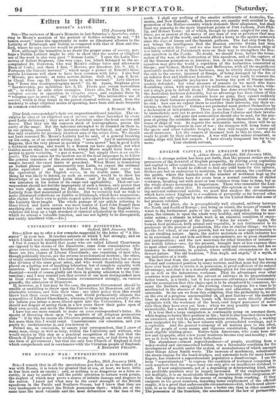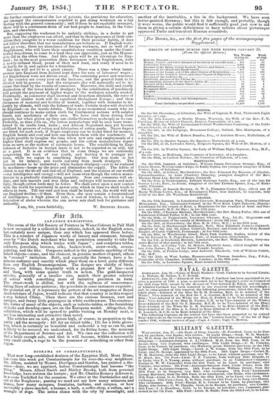ENGLISH CAPITAL AND ENGLISH ENERGY.
1, Adam Street, Adelphi, 23d January 1854. Sin—A strange notion has been put forth, that the present strikes are the precursors of the downfall of English prosperity, by driving away capitalists and capital to other countries, where a more obedient race of working people may be found. It would be difficult to find any solid basis for this opinion. Strikes are but an endeavour to maintain, by trades unions, the condition of the guilds, where the limitation of the number of workmen kept up the rate of wages. Strikes have for years been a normal condition of skilled workmen, breaking out with more or less violence from time to time, but on the whole always decreasing in importance. Those who remember the Lud- dites will readily attest this. In examining this opinion as to our impend- ing national commercial suicide, we must first analyze the circumstances which have raised England to a condition of prosperity so far beyond other nations, and only equalled by her offshoots in the United States and some of her present colonies. In the first place, she is geographically well situated, midway between the North and South of Europe ; and being an island, the means of transit by water to the furthermost parts of the earth are unimpeded. In the next place, the climate is upon the whole very healthy, and stimulating to mus- cular action ; a climate in which work is an essential condition of enjoy- ment, the very opposite of the Italian " dolce far niente." Again, the human food produced, both animal and vegetable, is not detrimental to its producers in the process of production,- like rice or similar things : we have not the best wheat, of our own growth, but we have a near approximation to it, art rivalling nature. Again, the native materials on which industry has to be exercised, coal and iron and their concomitants, are in great abundance and juxtaposition ; and the raw materials for other branches of indus
the textile fabrics—are, for the present, brought here at less expense to most other countries. The population is sturdy and numerous, and has no tendency to deteriorate, in general, where artificial circumstances do not thwart nature. The old tradition, "Non Angli, sed angeli," if a myth, is one indicative of a truth.
The fact that from the earliest periods of history this island has been a coveted and contested position by many nations, and that none but the strong have ever been able to retain it in possession, is proof sufficient of its natural advantages, and that it is a desirable abiding-place for the energetic capital- ist as well as the industrious workman. That its advantages over other countries were greater before the advent of railways in its proportionately better transit is a truth • but it has numerous advantages still remaining ; and the assumption that this choice spot is to be abandoned by commerce, be- cause the freeborn energy of thevorking classes happens for a time to be misdirected in the absence of due iflatruction and education, seems utterly untenable So far are we from this cofldtion, that the probability is, we are on the eve of a progress unexeruplified ih.,all past history—of the desirable time in which workmen of the hands wi become more directly sharing capitalists with the workmen of the head, and larger possessors of mate- rials than they have ever yet been ; when we may possibly have less men numerically, but a much larger amount of manhood. It is true that a large emigration is continually going on amongst them, while hoping to better their position in life ; but it is also true that there is now an extensive, and will be a greater, continuous return. Formerly, a working man emigrated for life ; he now returns with accumulated earnings, and is a capitalist. And the general testimony of all nations goes to the effect, that for people of some means and vigorous constitution, England is the most eligible abiding-place. Native-born Americans, who come here sal- low and dyspeptic, after a few years' residence become rosy and healthy ; they are as it were born again in their fatherland. The abundance—almost superabundance—of people, resulting from a water-walled and circumscribed habitat, was a favourable condition for the development of wealth under the system of manufactures of which amongst other things Adam Smith wrote. The increase of machinery, substituting the steam-engine for the hand-drudges, and automatic tools for mere human fingers, has rendered a superabundant population a disadvantage. I use the term "superabundant" to express the condition of workmen competing in such numbers that the wages-fund can only give an insufficient dividend to each. If new employments, not of a degrading or deteriorating kind, arise, the profitable numbers may be largely increased. If the employments do not multiply, it is an incalculable blessing for humanity that emigration af- fords the surplus workmen the means of escaping from crushing. If they emigrate in too great numbers, denuding home employment of the efficient supply, it is a proof that unfavourable circumstances exist, which need altera- tion, so as to keep their condition here a better one than in other countries. The possession of the franchise, the amendment of the law of partnerships
the further amendment of the law of patents, the provisions for education, are amongst the circumstances required to put rising workmen on a fair footing with the general community ; and if these be not equitably arranged, there will be a continuous drain of our best people to America, to the Colo- nies, and elsewhere.
But, suprosing the workmen to be unfairly striking, in a desire to get more than the employers can afford, and that in their ignorance of their con- dition-they emigrate to a worse condition for their peculiar habits, it does not follow therefore that our manufactures are to leave us. If English work- men go away, there are abundance of foreign workmen, not so well off as Englishmen who will leave their unsatisfactory condition under the Conti- nental despotisms, to come to a land they can appreciate, just as the [fugue- cots did in the olden time. And this again will be an advantage for Eng- land; for in the next generation these foreigners will be Englishmen, with a newly-infused blood, proud of their new land, and ready if need be to do battle for it, and agitate for a franchise. But this will not be to a great extent. There was a time when immi- gration into England from Ireland kept down the rate of labourers' wages ; yet Englishmen were not driven away. The sustaining power and resources of the country are every year on the increase, and the general fund to be divided will be greater. And the emigrants also will materially aid to in- crease this fund by the results of commerce. Moreover, the daily and yearly diminution of the lower kinds of drudgery by the substitution of machinery will permit the payment of higher wages to the workmen actually needed. Eventually, as commerce shall increase and despotism diminish, the rates of wages for similar work will be equalized throughout Europe ; and then cheapness of material and facility of transit, together with stimulus to in- dustry by climate, will rule the balance of trade. Certain trades will diminish in England—as the textile fabrics. There is no economical reason why we should continue to make cotton cloth for Continental nations with surplus hands and machinery of their own. We have clad them during their growth, but when gtown up they can clothe themselves as cheaply as we can. Probably, as time rolls on, the cotton manufacture will be once more trans- ferred to its cradle land, India ' • and African Negroland may yet become civilized by growers of cotton and fabricators of cotton goods. Negro fingers are fitted for such work, if Negro employers can be found fitted for masters. English hands and coal and iron can furnish them with the machinery. It is quite possible to imagine the time when new arts and employments of a higher kind shall engross our people, and the cotton manufacture depart from us save as the makers of automatic looms. The establishing by Eng- lishmen of factories in foreign lands is not to be regarded as an evil, but as a good. It is an evidence that in some things we are nationally outgrowing the work of our youth, and leaving it to younger na- tions, while we aspire to something higher. Our iron trade is but ygt in its infancy, and needs rescuing from much drudgery. The demand seems to be unlimited ; while human drudgery—yet to be replaced by machines—keeps up the price and diminishes the supply. The fabric of cotton is not the be-all and end-all of England, and the sources of our wealth —our intelligence and energy—will not cease even though the cotton manu- facture be a gradually diminishing quantity. Seas and commerce will en- dure, and iron masters and iron ships and railways will increase and mul- tiply, though cotton lords may be fewer. We shall enter upon a new contest with the world for superiority in newer arts, which in time we shall teach to others in turn. Till our coal and iron shall be burnt out, the world will not see England decline—if then. Even then, she may remain a fountainhead of intelligence, a high place of rule, a seat of wisdom, to which a huge federation of states wherein the sun never sets shall look for guidance and authority.































 Previous page
Previous page